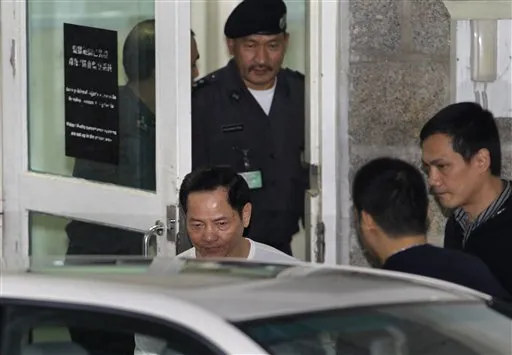The World Hongmen History and Culture Association is a modern organization that describes itself as an ethnic fraternal group dedicated to promoting Chinese culture abroad. Established in 2013, it takes its name from a centuries-old secret society in China, also called the Hongmen.
In the past, as in the present, the group has been revealed to be a facade for organized crime. It is active around the world and has a growing presence in Africa.
Wan Kuok Koi, one of Asia’s most powerful crime bosses, leads the modern iteration of the Hongmen. He created the association after serving nearly 14 years in a Macau prison for attempted murder, criminal association, loan sharking and illegal gambling.
“Hongmen have long been intertwined with overseas Chinese networks, including with criminal triad societies,” Martin Purbrick wrote in a June 7 analysis for the Jamestown Foundation research institute. “Hongmen’s identity has continued to straddle the line between cultural organization and criminal enterprise.”
Wan, known by the nickname “Broken Tooth,” was the former leader of the 14K triad, one of China’s largest transnational organized crime syndicates, which was involved in drug trafficking, cybercrime, human trafficking, illegal gambling, racketeering and a variety of other crimes.
As authorities in Southeast Asia have cracked down on crime, syndicates have turned their attention to Africa in search of new markets and vulnerabilities.
“There have been increasing indications of major Asian criminal networks establishing connections and operations on the continent and exploiting similar vulnerabilities to those present in Southeast Asia,” the United Nations Office on Drugs and Crime (UNODC) said in an April report.
“World Hongmen History and Culture Association has also been reported increasing activity in Uganda and other African countries in recent years.”
There are two 14K groups among the seven Chinese criminal organizations reportedly operating in South Africa. 14K-Hau and 14K-Ngai are active in Cape Town and Johannesburg, specializing in extortion and abalone trafficking. In 2000, the groups took in an estimated $32 million from the illegal exportation of abalone to Hong Kong, according to the Pretoria-based Institute for Security Studies.
The same type of large-scale transnational criminal enterprises that Hongmen members have been accused of carrying out in Southeast Asia have surfaced in the past year in Nigeria. Uganda has emerged as a major source for trafficking victims, and South Africa has grown as a financial crime hub, UNODC investigators said.
Frequently with Chinese nationals in charge, these operations have made tens of billions of dollars a year by targeting victims throughout the globe with fake investments, cryptocurrency, romance and other cyber scams. They are notorious for acquiring and using the labor of human trafficking victims.
New reporting has shown a growing connection between the Chinese government and Chinese organized crime groups. A June 24 Washington Post investigation found that the Hongmen Association is entangled with the Chinese Communist Party (CCP) in ways that had not previously been reported.
Nathan Paul Southern, a researcher at the Eyewitness Project, an independent group investigating illicit industries, said the Hongmen are not like Chinese triads, which prioritize controlling territory.
The Hongmen Association formed as a “constellation of business structures,” which allowed it to expand rapidly across parts of the Global South hungry for investment, he told the Post.
Purbrick said the CCP has turned a blind eye to Hongmen ventures as they have expanded across countries that are part of China’s Belt and Road Initiative, where Hongmen and related triads are active. These sprawling enterprises are a cog in the CCP’s united front strategy to spread influence beyond its official reach while downplaying direct associations with the Chinese government.
“These organizations serve the purposes of united front work,” he said. “The CCP has tolerated and even benefited from this arrangement, as triad-affiliated Hongmen groups serve its geopolitical goals.”
Martin Thorley, a senior analyst focused on China at the Global Initiative Against Transnational Organized Crime, said there is compelling evidence tying the Hongmen Association to the CCP, including photos of Wan receiving a state award for patriotism.
“This is beyond clandestine diplomacy,” Thorley told the Post. “This is crime that is really deeply entrenched in state machinery.”
Thorley said the CCP makes “precise, deliberate” decisions on its associations, and Wan is “arguably the most notorious criminal on the continent. For them to have given him an award … it’s as clear-cut as it gets. It was an endorsement.”

